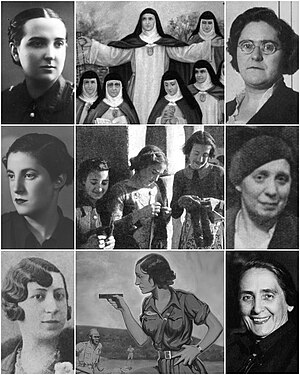| Part of a series on |
| Women in the Spanish Civil War |
|---|
 |
|
|
Prostitution in the Spanish Civil War was part of a larger ideological battle about the role of women and race. Opposition to it came from both first-wave feminists and fascists, who would often have connections to beliefs about racial purity in their condemnation of prostitution. Accusations of prostitution would also be made to damage political and social enemies.
In the modern pre-Second Republic period, prostitution was illegal in Spain, though in the latter period, efforts were made to legalize it under the justification that it would assist in improving people's health by better addressing the spread of venereal disease.
During the Dictatorship of Primo de Rivera, being a labeled a prostitute could be a disqualifier from participating in public life. Women in the anarchist CNT opposed prostitution as part of wider efforts related to women's emancipation.
The Second Republic period saw Spaniards oppose prostitution as they argued in favor of racial purity arguments and maintained it led to the spread of venereal disease. Starting in 1931 and continuing through to 1935, the Second Republic adopted both an abolitionist and regulatory approach to appease both sides of the debate.
During the Civil War, prostitution became an important issue for many women on the left to the confusion of foreign feminist allies. With women featuring heavily in propaganda on both sides, milicianas were accused by military and political leaders of being prostitutes and nymphomaniacs, in order to discredit their involvement on the front lines. Nationalist military members would often use female prostitutes on the home front.[citation needed]
It is difficult to assess the extent of the problem of prostitution in the Franco period as lesbians, considered undesirable, were simply accused of being prostitutes.
© MMXXIII Rich X Search. We shall prevail. All rights reserved. Rich X Search
